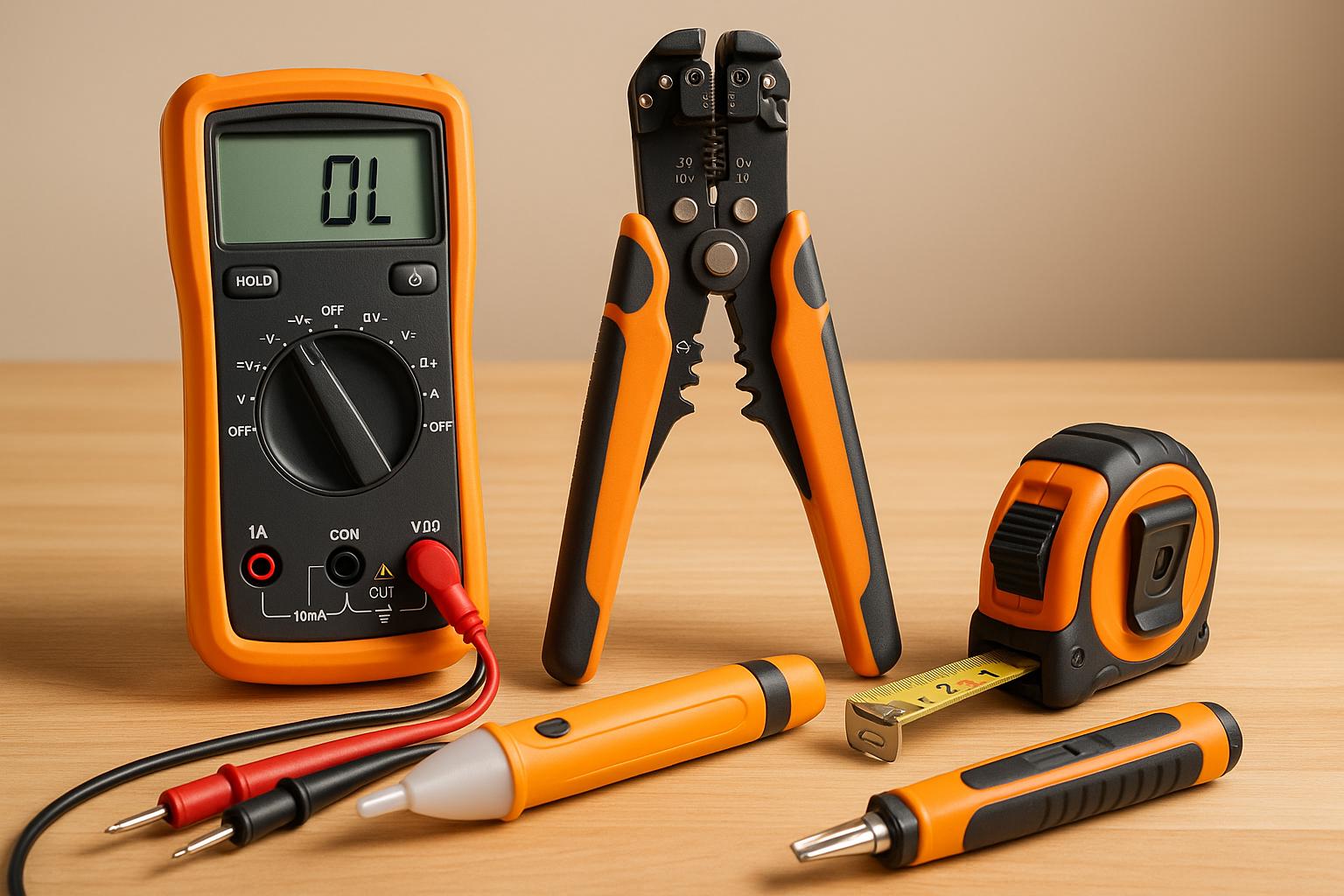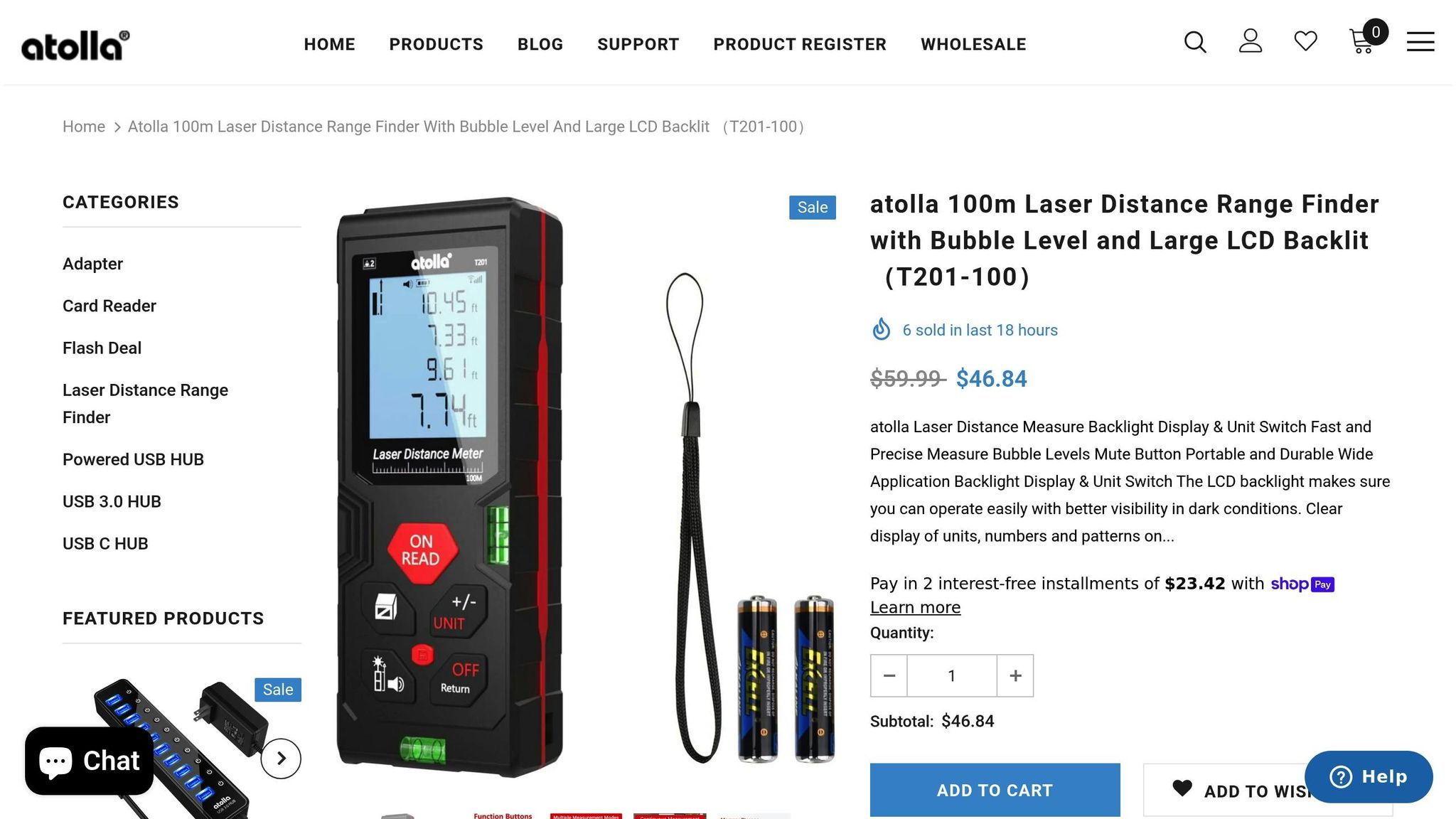
When working on DIY electrical projects, choosing the right measuring tools is critical for accuracy, safety, and efficiency. From clamp meters to laser tape measures, each tool serves a specific purpose, helping you measure current, voltage, distances, and more. Here's a quick breakdown of the best tools:
- Clamp Meters: Ideal for measuring current without disconnecting wires. The Fluke 323 ($120–$150) offers precision and durability, while the Klein Tools CL800 ($140) adds DC measurement and temperature sensing. For budget-friendly options, the AstroAI Clamp Meter ($25–$40) is a solid pick.
- Digital Multimeters: Versatile for voltage, resistance, and current measurements. The Bosch GDM 600-15 ($60–$120) balances functionality and price.
- Laser Tape Measures: Great for quick, precise distance measurements. The Klein 93LDM200 ($70) is accurate up to 200 feet, while the Atolla T201 (<$50) offers basic features at a lower cost. High-end users might prefer the Bosch GLM165-22 ($199) for advanced capabilities.
- Measuring Tapes: Affordable and reliable for basic tasks. Options like Milwaukee and Stanley ($8–$30) remain essential for every toolkit.
Quick Comparison:
| Tool Name | Accuracy | Measurement Range | Safety Rating | Price (USD) |
|---|---|---|---|---|
| Fluke 323 Clamp Meter | ±2.0% (AC current) | 400A AC, 600V AC | CAT III 600V | $120–$150 |
| Klein CL800 Clamp Meter | ±1.5% (AC voltage) | 600A, 1000V AC/DC | CAT III 600V, CAT IV 400V | $140 |
| AstroAI Clamp Meter | ±2.0% (AC current) | 400A AC, 600V AC/DC | CAT II 600V | $25–$40 |
| Bosch GDM 600-15 Multimeter | ±0.5% (DC voltage) | 600V AC/DC | CAT III 600V | $60–$120 |
| Klein 93LDM200 Laser Measure | ±1/16 inch | 200 feet | N/A | ~$70 |
| Atolla T201 Laser Measure | ±1/8 inch | 196 feet | N/A | <$50 |
| Bosch GLM165-22 Laser Measure | ±1/16 inch | 165 feet | N/A | ~$199 |
| Milwaukee/Stanley Tape | ±1/16 inch | 25 feet | None | $8–$30 |
Each tool has its strengths, so your choice will depend on your project needs and budget. For added convenience, platforms like Toolstash can help you organize and maintain your tools.
Don't Do Your Own Electrical Without These Must Own Tools! How To Check Voltage
1. Fluke 323 True-RMS Clamp Meter
The Fluke 323 is a reliable clamp meter designed for precise measurements, making it a solid choice for DIY electrical projects and troubleshooting.
Accuracy
Equipped with True-RMS technology, the Fluke 323 ensures highly accurate readings, with a ±2.0% accuracy for AC current and ±1.0% accuracy for AC voltage. It also features a 5-digit resolution, which allows it to handle both sinusoidal and non-sinusoidal waveforms effectively [7]. This precision is particularly useful when working with non-linear loads like LED lighting systems or variable-speed motors, where accuracy is critical for diagnosing electrical issues or verifying performance.
Measurement Capabilities
The Fluke 323 is versatile, measuring AC current up to 400 A, AC voltage up to 600 V, and resistance up to 4 kΩ [7]. Its clamp design enables non-intrusive current measurements, letting you check current flow without the need to disconnect wires or shut off power. For added convenience, it includes a hold function that freezes the display reading - perfect for working in tight or awkward spaces [5]. However, it’s worth noting that the meter does not measure DC current, which may limit its use for tasks involving solar panels or automotive systems [5].
Safety Features
Safety is a priority with the Fluke 323. It boasts a CAT III 600 V safety rating, providing protection against transient voltages in fixed installations like circuit breakers and distribution panels [7]. The insulated housing and large jaw opening allow for safe, non-intrusive measurements around standard residential wires. Built to handle drops and tough conditions, this meter is well-suited for the demands of DIY environments, offering peace of mind alongside performance.
Affordability
Priced between $120 and $150, the Fluke 323 strikes a balance between reliability and durability. Backed by a two-year warranty and strong user feedback, it’s a dependable choice for those seeking professional-grade performance at a mid-range price point [3][5].
2. Klein Tools CL800 Digital Clamp Meter

The Klein Tools CL800 is a versatile clamp meter that blends professional-grade functionality with ease of use, making it a great choice for both experienced electricians and DIY enthusiasts.
Accuracy
The CL800 ensures dependable readings, offering ±1.5% accuracy for AC voltage and ±2.0% for AC current[3]. Thanks to its True RMS and auto-ranging capabilities, it delivers precise measurements, even when dealing with non-linear loads like LED lighting or variable-frequency drives[3][5].
Measurement Capabilities
This clamp meter goes beyond the basics. It measures AC/DC voltage up to 1,000V and current up to 600A, while also handling resistance, continuity, frequency, capacitance, and temperature readings[3][5]. A built-in voltage detection feature enhances safety by alerting users to live circuits before making contact[5].
Safety Features
Safety is a top priority with the CL800. It boasts CAT III 600V and CAT IV 400V ratings, ensuring solid protection against voltage spikes in residential and light commercial settings[3]. The meter is built with double insulation and a tough thermoplastic shell to endure demanding jobsite conditions. Additional features like a low battery indicator and automatic power-off help prevent unexpected shutdowns and conserve battery life[3]. These features make the CL800 both reliable and practical for everyday use.
Affordability
At roughly $140, the CL800 offers an impressive range of features typically found in more expensive models[5]. It’s a more budget-friendly alternative to premium options like the Fluke 323, yet it includes extras such as DC measurement, temperature sensing, and broader voltage ranges. Klein Tools also provides a two-year limited warranty, giving users added peace of mind[3]. For those juggling multiple tools, platforms like Toolstash can help keep track of the CL800 and other equipment, offering maintenance reminders and DIY guides to ensure safe and efficient operation.
3. AstroAI Digital Clamp Meter

The AstroAI Digital Clamp Meter is a budget-friendly choice for DIY enthusiasts tackling electrical tasks, with a price range of $25 to $40.
Accuracy
This clamp meter offers ±2.0% accuracy for AC current and ±1.0% accuracy for voltage measurements[3]. While it doesn’t rival high-end professional tools, its precision is more than adequate for common DIY projects like diagnosing outlet issues, checking appliance current usage, or confirming circuit voltages. It delivers reliable performance for everyday electrical troubleshooting.
Measurement Capabilities
The AstroAI Digital Clamp Meter can measure AC/DC voltage up to 600V, AC current up to 400A, and resistance up to 40MΩ. It also supports continuity and diode testing, with the option for temperature measurements using a thermocouple[6]. The clamp design allows for non-contact current readings, making it safer and more convenient - you can measure current by simply clamping the device around a single conductor without disconnecting anything[6]. These features make it a versatile tool for basic electrical work.
Safety Features
Equipped with overload protection, insulated test leads, and non-contact voltage detection, the AstroAI is designed with user safety in mind[3]. Its CAT II 600V safety rating makes it suitable for residential and light commercial use[6]. The non-contact voltage detection feature is especially handy for identifying live wires without the need for direct contact, minimizing the risk of electric shock during troubleshooting[3].
Affordability
With a price tag between $25 and $40, this clamp meter is an excellent option for occasional DIY tasks. It includes a one-year limited warranty and offers responsive customer support[3]. On major retail platforms, it consistently earns ratings of 4.5/5 stars or higher, with users praising its affordability and dependability for basic electrical projects[6]. For those juggling multiple tools, platforms like Toolstash can help keep track of usage and provide helpful guides for electrical work.
4. Bosch GDM 600-15 Digital Multimeter

The Bosch GDM 600-15 is a reliable mid-range multimeter designed for DIY electrical projects. Priced between $60 and $120, it delivers the essential features most home electricians need without the hefty cost of professional-grade tools.
Accuracy
With an accuracy range of ±0.5% to ±1% for DC voltage measurements, the Bosch GDM 600-15 stands on par with other solid mid-range options[3]. This level of precision is ideal for common tasks like checking outlet voltages, testing batteries, or verifying circuit continuity. While it doesn’t rival high-end professional meters in terms of pinpoint accuracy, it’s more than sufficient for residential electrical needs. Whether you're troubleshooting a faulty outlet or ensuring safe connections, this multimeter provides dependable results.
Measurement Capabilities
The Bosch GDM 600-15 covers all the essential electrical measurements for most DIY jobs, including AC/DC voltage, AC/DC current, resistance, and continuity testing[3]. It also offers diode and transistor testing, making it a handy tool for tackling slightly more advanced electronics issues. Its auto-ranging feature simplifies operation by automatically selecting the appropriate range, reducing the chance of user error. This is particularly helpful when working in tight spaces or under time constraints[6].
Safety Features
Safety is a standout feature of the Bosch GDM 600-15. With a CAT III 600V safety rating, it’s well-suited for residential and light commercial environments[3]. The multimeter includes overload protection and insulated test leads, reducing the risk of accidental shocks. Its sturdy casing adds an extra layer of protection against drops and impacts - an inevitable occurrence during hands-on DIY work. These built-in safeguards ensure you can work confidently, even when dealing with live circuits.
Affordability
Priced between $60 and $120, this multimeter strikes a balance between quality and affordability. It offers more features than entry-level models without venturing into the higher price range of professional tools, which can easily exceed $200. Bosch also supports the GDM 600-15 with a one-year limited warranty that covers defects in materials and workmanship. Additionally, their nationwide service network provides easy access to repairs and support. For those looking to better organize their tools and projects, platforms like Toolstash can be a helpful resource, offering tips and guides to streamline your electrical work.
5. Klein Tools 93LDM200 Laser Tape Measure
The Klein Tools 93LDM200 combines laser precision with a wallet-friendly price, making it a practical choice for DIY electrical projects. At around $69.99, this laser tape measure offers a 200-foot range, perfect for tasks like measuring outlet spacing or planning conduit runs for both indoor and outdoor installations.
Accuracy
With a precision level of ±1/16 inch, the 93LDM200 meets the standard for high-quality laser measures [2]. This accuracy is ideal for common electrical jobs such as spacing outlets, measuring wall spans for cable runs, or verifying room dimensions. By delivering consistent results, it minimizes the chances of human error, ensuring your measurements are spot on.
Measurement Capabilities
This laser tape measure specializes in distance measurement, offering reliable performance up to 200 feet. While it doesn’t include extra functions like area or volume calculations, this simplicity makes it well-suited for straightforward electrical tasks like determining conduit lengths, spacing junction boxes, or measuring cable runs [1].
The backlit LCD display clearly presents measurements in feet and inches (e.g., 12.5 ft or 8' 3-1/2"), adhering to common US building practices. Its laser technology also allows you to measure across obstacles or long distances without needing an extra set of hands. Plus, its durable design ensures it can handle the rigors of jobsite conditions.
Safety Features
Built for tough environments, the 93LDM200 features weather- and dust-resistant housing to endure the challenges of active work sites [1]. Although it doesn’t include specialized features like insulation testing, its sturdy construction protects against drops, dust, and moisture. Its compact size makes it easy to carry in a tool belt or pocket, reducing the chance of misplacing it while on the job.
Affordability
The Klein Tools 93LDM200 strikes a great balance between performance and cost, offering reliable laser accuracy without the hefty price tag of premium models. It’s an appealing option for homeowners and DIYers who want dependable performance at a reasonable price.
For those looking to organize their tools, platforms like Toolstash can help track and manage devices like the 93LDM200 while providing helpful guides for electrical projects. With its straightforward functionality and precise measurements, this laser tape measure is a valuable addition to any toolkit focused on efficiency and accuracy.
6. Atolla T201 Laser Tape Measure

The Atolla T201 Laser Tape Measure is a budget-friendly tool, perfect for DIY electrical projects. Priced at under $50, it delivers reliable performance for tasks like measuring conduit runs or planning panel placements.
Accuracy
The T201 offers an accuracy of ±1/8 inch (±3 mm). While it doesn’t match the precision of higher-end models with ±1/16 inch accuracy, it’s more than adequate for most electrical work.
Measurement Capabilities
With a range of up to 196 feet (60 meters), this laser tape measure handles both indoor and outdoor measurements with ease[1]. It features different modes, including continuous measurement, area, and volume calculations, making it versatile for layout planning. The backlit display ensures you can easily read measurements, even in dimly lit spaces like basements or utility rooms.
Safety Features
While the T201 doesn’t carry specific electrical safety certifications, its non-contact laser measurement system adds a layer of safety. By allowing you to measure distances without physical contact, it minimizes the risk of exposure to live electrical components[1]. Its sturdy housing is designed to withstand minor drops and the wear and tear of DIY tasks.
Affordability
At less than $50, the Atolla T201 is an excellent choice for DIYers looking for dependable distance measurement without the hefty price tag of professional-grade tools[1]. Compared to premium models that can cost $100 or more, this device delivers great value. For those juggling multiple tools and projects, platforms like Toolstash can help keep track of devices like the T201 while offering guidance on electrical projects.
7. Bosch GLM165-22 Laser Tape Measure
The Bosch GLM165-22 Laser Tape Measure is a high-end choice for DIY enthusiasts working on electrical projects. Priced at roughly $199, it offers more than just basic distance measurements, delivering features tailored to more demanding tasks [2].
Accuracy
This device provides exceptional precision with an accuracy of ±1/16 inch. For comparison, many standard models only offer ±1/8 inch accuracy, making the GLM165-22 a standout option for projects where precision is key [2].
Measurement Capabilities
With a maximum range of 165 feet, the GLM165-22 is versatile enough for both indoor and outdoor applications [1][2]. Its variety of measurement modes makes it a multifunctional tool. These include distance, continuous, area, volume, Pythagorean, wall area, stakeout, and leveling. Whether you’re calculating square footage for an electrical layout or tackling indirect measurements when obstacles are in the way, this laser tape measure has you covered.
Safety Features
The GLM165-22 doesn’t just focus on performance - it also prioritizes safety and durability. It features an auto shutoff function to conserve battery life and minimize accidental laser exposure [1]. Additionally, the green laser ensures better visibility in bright conditions, while its dust- and splash-resistant housing makes it tough enough to handle typical DIY environments.
Affordability
At approximately $199, the GLM165-22 is an investment, especially compared to basic models that start around $40–$60. However, for those who frequently handle electrical projects, its advanced capabilities make it worth the price.
Platforms like Toolstash can further enhance your workflow by simplifying tool tracking and project documentation.
8. Traditional Measuring Tapes (Milwaukee, Stanley)

While digital and laser tools boast advanced features, traditional measuring tapes remain a go-to choice for their simplicity and reliability. Tools like Milwaukee and Stanley measuring tapes are essential in nearly every electrician's toolkit. In fact, industry surveys reveal that over 90% of electricians use a tape measure daily for tasks like measuring conduit runs, spacing outlets, and verifying clearances[6]. Let’s break down their performance in terms of accuracy, measurement capabilities, safety, and cost.
Accuracy
Traditional measuring tapes from brands like Milwaukee and Stanley deliver precision within 1/16 inch to 1/32 inch over distances up to 25 feet. This level of accuracy is more than enough for common electrical tasks like measuring conduit runs, determining outlet spacing, or checking clearances[8][4]. However, maintaining this precision requires proper care - bent or damaged tapes can lead to inaccurate measurements.
Measurement Capabilities
These tapes are designed to measure linear distances, typically in imperial units like inches and feet, though some models also include metric markings. They’re perfect for marking electrical box locations, measuring cable runs, and verifying clearances. Features like standout capability, dual-sided markings, and fractional readouts make them even more versatile. Popular options include the Milwaukee 25 ft. Magnetic Tape Measure and the Stanley PowerLock 25 ft. Tape Measure.
Safety Features
Most traditional tapes are made from metal or reinforced plastic, which means they lack built-in electrical insulation. This makes it essential to exercise caution when working near live circuits[8][4]. A few models offer added safety features, such as non-conductive blades or rubberized casings, but these are less common.
Affordability
One of the biggest advantages of traditional measuring tapes is their affordability. Priced between $8 and $30, they provide a budget-friendly alternative to digital or laser tools, which can range from $50 to over $200[1][2][4]. While some users find newer models slightly bulky or stiff at first, their cost-effectiveness and reliability make them a popular choice for DIYers and professionals alike.
Platforms like Toolstash (https://toolstash.com) can help you keep your tools organized and offer helpful DIY guides to find the perfect tape measure for your needs.
Pros and Cons
When picking the best measuring tool for your DIY electrical projects, it’s important to weigh each option’s strengths and limitations. As highlighted in the reviews above, your choice should balance accuracy, safety, and budget.
Clamp meters are a go-to for measuring current without needing to interrupt a circuit, making them particularly safe for electrical work. The Fluke 323 True-RMS Clamp Meter stands out for its precision and durable design, earning a 4.7/5-star rating on Amazon. However, its premium price of $120–$150 and lack of a backlight might be deal-breakers for some[5]. Another strong contender is the Klein Tools CL800 Digital Clamp Meter, which also boasts a 4.7/5-star rating. It combines clamp meter functionality with basic multimeter features, though its bulkier design can feel unwieldy[5]. For those on a tighter budget, the AstroAI Digital Clamp Meter is a solid pick at $25–$40, offering a 4.5/5-star rating. That said, it lacks some of the advanced features found in higher-end models[3].
Digital multimeters, like the Bosch GDM 600-15, are prized for their versatility. They measure voltage, current, and resistance with dependable accuracy. Priced between $60–$120, this tool provides great value, though it demands a bit more knowledge of electrical concepts, which might be daunting for beginners[3].
Laser tape measures are ideal for quick and accurate distance measurements. The Klein Tools 93LDM200 Laser Tape Measure offers professional-grade precision up to 200 feet with a simple one-button operation, priced at around $70[1][2]. However, it’s limited to straight-line measurements. For a more affordable option, the Atolla T201 Laser Tape Measure costs under $50, though some users have reported inconsistent laser alignment in cluttered spaces[1]. At the higher end, the Bosch GLM165-22 delivers impressive precision at approximately $199 but comes with a hefty price tag.
Here’s a quick comparison of key specs:
| Tool Name | Accuracy | Measurement Range | Safety Certification | Price (USD) |
|---|---|---|---|---|
| Fluke 323 True-RMS Clamp Meter | ±2.0% AC current, ±1.0% AC voltage | 400A AC, 600V AC | CAT III 600V | $120–$150 |
| Klein Tools CL800 Digital Clamp Meter | ±1.5% AC voltage, ±2.0% AC current | 600A, 1000V AC/DC | CAT III 600V, CAT IV 400V | $140 |
| AstroAI Digital Clamp Meter | ±2.0% AC current, ±1.0% voltage | 400A AC, 600V AC/DC | CAT II 600V | $25–$40 |
| Bosch GDM 600-15 Digital Multimeter | ±0.5% to ±1.0% DC voltage | 600V AC/DC | CAT III 600V | $60–$120 |
| Klein Tools 93LDM200 Laser Tape Measure | ±1/16 inch | 200 feet | N/A | ~$70 |
| Atolla T201 Laser Tape Measure | ±1/8 inch | 196 feet | N/A | <$50 |
| Bosch GLM165-22 Laser Tape Measure | ±1/16 inch | 165 feet | N/A | ~$199 |
| Traditional Measuring Tapes (Milwaukee, Stanley) | ±1/16 inch | 25 feet | None | $8–$30 |
Traditional measuring tapes remain a reliable choice for many tasks. They don’t require batteries, can handle tough jobsite conditions, and cost significantly less than digital tools. With 4.5/5-star ratings for Milwaukee and Stanley models, their durability is well-regarded. However, they’re slower for measuring long distances and less precise compared to laser tools[5][1][2].
Safety is a priority when working with electrical systems. Tools like clamp meters and multimeters with CAT III or CAT IV ratings provide essential protection against electrical surges, making them suitable for residential and light commercial use[3]. On the other hand, traditional measuring tapes offer no electrical protection, so extra care is needed around live circuits.
Battery dependency is another factor to consider. Digital tools rely on power - whether from rechargeable batteries or standard AAA options - while traditional measuring tapes are always ready to use without needing a power source[1][2].
Ultimately, the right tool depends on your needs. Advanced features and higher accuracy are worth the investment for complex electrical work, while budget-friendly options often suffice for simpler tasks. If you’re managing multiple tools, platforms like Toolstash (https://toolstash.com) can help organize your equipment, provide buying advice, and guide you in choosing the ideal tool for each job.
Conclusion
Getting accurate measurements and following safe practices are essential for any successful DIY electrical project. Choosing the right tools means finding the right balance between precision, ease of use, and budget. Here's a quick rundown of the tools and their best uses.
For accurate and safe current measurements, the Fluke 323 True-RMS is a standout option. Known for its precision and non-contact voltage detection, this tool is a dependable choice for homeowners tackling regular electrical tasks. While it costs between $120 and $150, its reliability makes it worth the investment.
If you're looking to measure distances with precision, a laser tape measure is a great choice. The Klein Tools 93LDM200, priced around $70, offers professional-level accuracy up to 200 feet with an easy-to-use one-button design. It's perfect for residential electrical work.
For those on a tighter budget, there are solid options under $50. The AstroAI Digital Clamp Meter and Atolla T201 Laser Tape Measure both provide dependable performance for basic measurement tasks. And for quick, no-fuss measurements, traditional measuring tapes from brands like Milwaukee and Stanley remain reliable go-to tools that don’t require batteries.
Safety should always come first when working with electricity. The Klein Tools CL800 Digital Clamp Meter, priced at $140, offers a CAT IV 400V certification, providing crucial protection against electrical surges. It combines the functionality of a clamp meter with basic multimeter capabilities, making it an excellent all-in-one tool.
Building a well-rounded toolkit is key. A reliable clamp meter for electrical measurements, a laser tape measure for precise distance readings, and a traditional tape measure for quick checks will cover most DIY electrical needs.
For DIYers juggling multiple tools and projects, Toolstash (https://toolstash.com) can be a helpful resource. It provides inventory tracking, buying advice, and how-to guides, making it easier to choose the right tools and keep your equipment organized.
FAQs
What safety features should I consider when selecting measuring tools for DIY electrical projects?
When picking measuring tools for DIY electrical tasks, safety should always come first. Start by checking for insulated grips, which help minimize the risk of electric shock. Also, pay attention to CAT safety ratings (like CAT III or CAT IV) to ensure the tool is suited for the voltage levels you’ll be handling. Another handy feature to consider is non-contact voltage detection, which lets you identify live wires without needing to touch them.
It’s also wise to opt for tools with overload protection. This feature not only safeguards the device but also adds an extra layer of safety for you. Stick to trusted brands known for producing high-quality tools that meet safety standards. By taking these steps, you’ll be better equipped to tackle your electrical projects securely and with confidence.
What’s the difference between a clamp meter and a digital multimeter, and when should you use each?
Clamp meters and digital multimeters are both indispensable tools for anyone working with electrical systems, but they’re designed for different tasks. A clamp meter specializes in measuring current without requiring you to disconnect any wires. This makes it perfect for quickly and safely checking current in live circuits.
In contrast, a digital multimeter is a more versatile tool. It can measure voltage, resistance, and current with precision, making it ideal for detailed diagnostics and troubleshooting tasks.
If you need to measure current in a live system and value speed and convenience, go with a clamp meter. For more detailed measurements or when dealing with smaller, delicate electrical components, a digital multimeter is your go-to option.
Are traditional measuring tapes still practical for DIY electrical work, or should I switch to digital and laser tools?
Traditional measuring tapes are still a go-to tool for many DIY electrical projects. They’re simple, budget-friendly, and perfect for quick tasks, especially in tight spaces or when measuring shorter distances. Plus, they don’t rely on batteries - just grab and go.
On the other hand, digital and laser measuring tools bring a whole new level of precision and convenience. They’re excellent for tackling more intricate projects, like measuring long distances or achieving precise layouts, all while saving time. For the best results, consider using a mix of both traditional and modern tools to match the specific needs of your project.